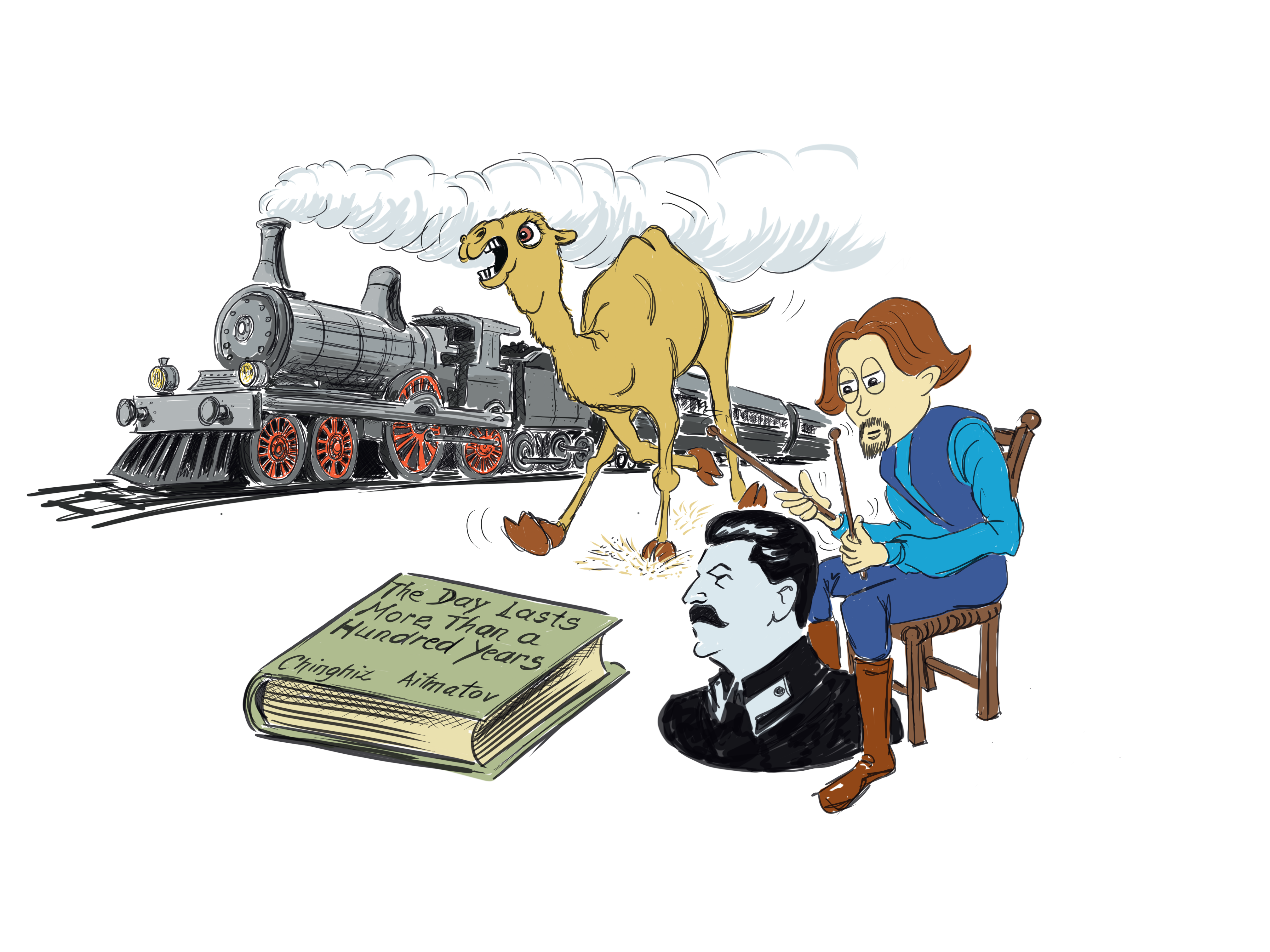Boranly-Burranyi

It was a novel once again. Edvard was supposed to present The Day Lasts More Than a Hundred Years (opens new window) by Chinghiz Aitmatov.
We met in a cafe in Vipava as we usually do. I arrived early, but Edvard was even earlier. He was somehow nervous.
“Come on, Edvard,” I said. “It is only us, fachidiots.”
“Yes,” said Edvard. “Sure.”
Janez and Jasmina arrived. She was there again.
Janez patted Edvard on the back. “You OK, Edvard?”
“Sure,” he said.
He was not. It always surprises me how shy Edvard really is. Yes, he played drums in a rock band years ago. But he was in the back, hidden. He dislikes any public appearances.
When all of us gathered, he was out of his comfort zone, you could see it. But his fear seemed to disappear as soon as he started talking. He made sure, however, that nobody except our table could hear him.
“The writer Chinghiz Aitmatov was born in 1928 to a Kyrgyz father and Tatar mother. In 1937, his father was charged with bourgeois nationalism and executed in 1938.”
“Don’t be a fucking Wikipedia, Edvard,” said Andi.
“Don’t be a fucking asshole, Andi,” said Jasmina.
Edvard continued as he’d heard nothing: “His novel The Day Lasts More Than a Hundred Year was published in 1980. What struck me the most is the way Stalinism is criticized. Stalin is rarely mentioned. Even his bureaucrats are rarely mentioned. The stupidity of the system is revealed through the tragic life of Abutalip and Zaripa Kuttybaev. The pair you simply must love.”
“Oh, dude,” said Andi. “We are crying again.”
“Abutalip had been taken prisoner in the second world war by the Germans, he later escaped and fought with the Yugoslav partisan army. When back in the Soviet Union, he was stigmatized his whole life for being a war prisoner. He should have committed suicide when he was captured, says one of the Abutalip’s pupils. Back when he still had pupils. Because at some point, he was not allowed to teach anymore. So he couldn’t support his family. The system destroyed him and his family.”
“Given that it was published in 1980, it is pretty fucking surprising the censors allowed the book,” said Andi.
“However, the scene I cannot forget,” continued Edvard, “is the scene with the legendary Karanar, Yedigei’s strong camel. The railman Burranyi Yedigei is the main character of the novel. He received young Karanar as a gift from a good man called Kazangap when he and his wife Ukubala arrived at the remote, almost forgotten Boranly-Burranyi junction. The friendship between Yedigei and Kazangap is deeply touching and at the heart of the novel. Well, Yedigei is infinitely proud of Karanar. But in a moment of hopelessness and despair which has something to do with Abutalip and Zaripa Kuttybaev, he projects his anger onto Karanar and beats him heavily. I couldn’t help remembering Mikolka in Dostoevsky’s Crime and Punishment when drunken Mikolka was trying to make his old mare pull a heavy wagon. The two scenes are different in their symbolism, but equally strong.”
“Yeah, that poor fucking Mikolka,” said Andi.
“Don’t say fucking when you talk about Dostoevsky,” I said. “You remind me of one of the professors in high school. She talked about Sonya Marmeladova and used the word whore. Really? How can you say Sonya was a whore?”
“Who is Mikolka?” asked Janez. “Tell us more please.”
“You know who Mikolka is, obviously,” said Jasmina.
“I don’t,” said Janez. “Please tell me.”
“But you’ve read Crime and Punishment!” insisted Jasmina.
“Just the first two pages,” said Janez.
“Mikolka gets angry and starts beating a feeble animal,” said Edvard. “He beats it ferociously and others join him, and they use crowbars and iron shafts. The old mare tries to resist, but it falls down dead. Of course, the two scenes from both novels are very much different, but both reveal a lot about us humans.”
“You are not human, Edvard. You are a fucking fachidiot,” said Andi.
And Edvard told us more. Much more. There were the same two guys sitting at the same table next to us as the last time and they started applauding when Edvard concluded his talk. Because at some point in between, Edvard forgot to talk quietly.
“Seems that they mean it,” said Jasmina approvingly.
“Yeah,” said Andi and turned towards the two: “You should join us next time, pals! It’s a unique experience hanging out with these fucking animals.”
“But you know, Edvard,” Jasmina continued, “I am glad you haven’t mentioned the science fiction part of the novel.”
“No need to,” said Edvard. “It’s kind of interesting though.”
“I don’t really think it is,” said Jasmina.
“Hey guys!” said one of the two guys, “it’s interesting what you are talking about, but we can’t hear you that well. Can you speak louder?”
“Boys,” I said. “Next time it will be loud, don’t miss it. This guy will talk.”
And I pointed to Andi, the loudest one among us, fachidiots.
